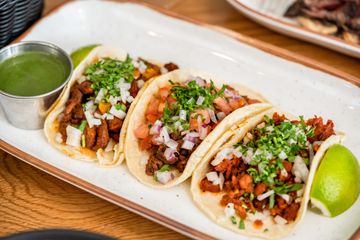Join coworkers for happy hour featuring margaritas and more
Is Mexican Food Healthy? Unloading the Nutritional Advantages of Typical Components
The question of whether Mexican food is healthy welcomes an exploration of its conventional active ingredients. Beans and corn function as foundational staples, rich in healthy protein and fiber. Avocados supply useful fats, while numerous herbs and flavors add flavor and health advantages - freshly made guacamole. With each other, these components develop a tapestry of nutrition. Nevertheless, the healthfulness of Mexican food typically depends upon prep work approaches and portion sizes. What function do these elements play in establishing its overall dietary value?
The Power of Beans: Healthy Protein and Fiber-Rich Staples
Typically forgotten, beans offer as a foundation of Mexican cuisine, supplying a wide range of dietary advantages. Rich in protein, they are a superb plant-based option for those seeking to satisfy their dietary healthy protein requires. This high protein web content sustains muscle mass fixing and growth, making beans vital for both vegetarians and meat-eaters alike. In addition, beans are a phenomenal resource of dietary fiber, which assists in digestion and advertises a feeling of volume, possibly aiding with weight management.
The range of beans utilized in Mexican meals, such as black beans, pinto beans, and kidney beans, adds to a varied flavor account and can enhance dishes nutritionally. In addition, beans are low in fat and consist of necessary minerals and vitamins, consisting of iron, magnesium, and folate. Together, these attributes make beans a crucial component, providing both nutrition and food in standard Mexican fare.

Corn: a Versatile Grain With Nutritional Benefits
Corn attracts attention as a versatile grain essential to Mexican food, commemorated not just for its culinary applications but additionally for its excellent nutritional account. As a primary active ingredient in dishes like tortillas, tamales, and pozole, corn gives important nutrients that contribute to a balanced diet plan. Rich in carbs, it offers as a significant energy resource, while also being low in fat, making it a beneficial alternative for numerous dietary needs.
Additionally, corn is a great resource of nutritional fiber, which assists in digestion and promotes satiety. It contains substantial amounts of vitamins such as B-complex vitamins, which are crucial for basal metabolism. The visibility of antioxidants, particularly carotenoids, adds to general health by decreasing oxidative tension. Additionally, corn is gluten-free, accommodating those with gluten level of sensitivities. In general, the nutritional advantages of corn highlight its significance in standard Mexican food and its duty in a healthy diet.
Avocados: Healthy And Balanced Fats and Nutrients in Every Bite
Avocados play a substantial duty in Mexican food, enhancing recipes with their velvety structure and abundant taste. Beyond their culinary allure, avocados are commemorated for their impressive nutritional profile. They are a rich resource of healthy and balanced monounsaturated fats, which can assist lower poor cholesterol degrees and support heart health. Additionally, avocados are loaded with necessary nutrients, including potassium, vitamin E, and B vitamins, adding to total wellness.
The high fiber content in avocados help digestion and promotes satiation, making them a valuable addition to any dish. Their special nutrient structure can also he has a good point sustain skin wellness and supply anti-inflammatory benefits. Incorporating avocados right into standard Mexican dishes or appreciating them as a see it here standalone snack can enhance both taste and nutrition, showing why they are a cherished staple in Mexican cuisine. On the whole, avocados use a delicious means to delight in healthy and balanced fats and vital nutrients in every bite.
Herbs and flavors: Flavorful Wellness Boosters
While enjoying the rich tastes of Mexican food, one can not ignore the important function that spices and natural herbs play in boosting both preference and health. Ingredients such as oregano, chili, and cilantro peppers not just add to the dynamic flavor account but additionally give significant health benefits. Cilantro is known for its cleansing homes, assisting to get rid of heavy metals from the body, while oregano is packed with anti-oxidants and has anti-inflammatory results.
Chili peppers, a staple in several Mexican recipes, have capsaicin, which has actually been linked to improved metabolism and discomfort relief. Additionally, seasonings like cumin and coriander assistance digestion and may assist in blood sugar level law. Including these savory health and wellness boosters into meals not just improves the culinary experience yet additionally advertises general well-being, making Mexican food not just delicious, yet additionally nutritionally advantageous.
Typical Food Preparation Techniques: Enhancing Nutrition and Taste
Conventional cooking approaches in Mexican food play a crucial duty in improving both nourishment and flavor, as they frequently focus on fresh components and time-honored strategies. Techniques such as nixtamalization, where corn is saturated and cooked in an alkaline remedy, not only boost the nutrient account of tortillas but likewise enhance their digestibility - best mexican westchester NY. Additionally, using slow-moving food preparation methods, like cooking or braising, allows flavors to fuse magnificently while keeping the honesty of the ingredients

Often Asked Concerns
Are Mexican Food Portions Generally Larger Than Other Foods?
Mexican food parts are commonly larger than those of lots of various other foods. This particular mirrors standard dining techniques, highlighting public sharing and hearty meals, which can lead to a much more substantial offering dimension overall.
Just how Does the Preparation Approach Affect Healthiness of Mexican Food?
Prep work methods substantially influence the healthiness of Mexican food. Methods such as grilling or steaming protect nutrients, while frying can raise undesirable fat web content. Choices of active ingredients and cooking styles inevitably determine general dietary value.
Can Mexican Food Be Customized for Specific Nutritional Constraints?
Mexican food can without a doubt be customized for particular nutritional constraints. Substitutions, such as making use of corn tortillas for gluten-free diets or integrating even more vegetables, allow people to enjoy standard tastes while accommodating various nutritional demands.
What Prevail False Impressions About Mexican Food and Health And Wellness?
Typical false impressions about Mexican food include the belief that it is inherently undesirable, extremely spicy, and entirely concentrated on fats. In fact, typical recipes frequently feature healthy components and can be tailored to numerous dietary demands.
Exist Much Healthier Options at Mexican Restaurants?
Much healthier alternatives at Mexican restaurants often consist of smoked meats, beans, and fresh veggies. Choosing recipes that highlight whole components and avoiding hefty sauces can lead to a much more healthy dining experience, promoting overall well-being.
The range of beans used in Mexican dishes, such as black beans, pinto beans, and kidney beans, contributes to a varied taste account and can improve meals nutritionally. Avocados play a substantial duty in Mexican food, matching dishes with their creamy texture and abundant taste. Integrating avocados into standard Mexican meals or enjoying them as a standalone snack can boost both taste and nutrition, showing why they are a precious staple in Mexican cuisine. While appreciating the abundant flavors of Mexican cuisine, one can not forget the crucial function that spices and herbs play in enhancing both preference and health and wellness. Standard cooking methods in Mexican food play a necessary role in boosting both nourishment and flavor, as they usually prioritize classic methods and fresh ingredients.